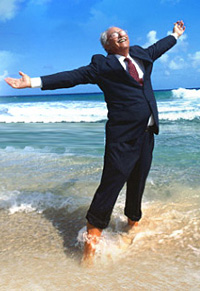
|  |  |  Vallarta Living | December 2008 Vallarta Living | December 2008  
Use Caution Before ‘Running Away’ After Retiring
 Wendell Cayton - WenatcheeWorld Wendell Cayton - WenatcheeWorld
go to original


| | It’s wise to move carefully, keep your dreams in your pocket and your feet on the ground. |  |
If the thought of throwing off the yoke and retiring to an exotic locale where the living is easy and the dollar buys more is enticing, it’s wise to move carefully, keep your dreams in your pocket and your feet on the ground.

Our pace is fast, and we are used to getting things done quickly. Living is easy in many of the exotic hot spots for a very good reason — people move at a slower pace. Rule one for making a successful transition to expatriate, says Rosanne Knorr, author of “The Grown-up’s Guide to Running Away From Home” and an expatriate herself, is to adapt to the local pace.

She advocates spending time in your prospective new home and immersing yourself in the local culture while researching tax laws, health care and cost-of-living issues before making a commitment.

According to Knorr, it takes time and patience to become accustomed to the way things get done in a foreign land. There is a lot the locals don’t know about “how we do it in America,” and the truth be told, they don’t care.

Buying a home may seem attractive, but she recommends renting first for more than one season. This will help you adjust to the climate, get a feel for utility costs and what the community is like once the tourists leave.

She suggests the best way to find a reasonably priced rental is to prowl around your new community and get to know the expat community. They can tell you what’s a deal.

Another expat, Dan Prescher, author and publisher of Internation alLiving.com — a Web resource for living abroad — makes a point that ownership laws are likely to differ from those in the U.S. Hiring a lawyer who represents only you in a transaction is a must.

Some countries, like Mexico, have restrictions on where foreigners can own land. For instance, in many beach communities, foreigners are not allowed to own beachfront property. Resourceful Mexican real estate salespeople have a solution: You can buy your beachfront cabana with a real estate trust known as a “fideicomiso.” A Mexican-owned bank will hold title and you name yourself as the beneficiary.

My dream house would be a chateau in the French Alps (daughter Cathryn thinks the south of France would be a neater place). Family disagreements aside, we would have to deal with the Napoleonic code that governs how property is inherited, regardless of a prior will or trust. This code would give the property to Cathryn on my death, disinheriting my wife. However, by writing a special agreement, called a “clause tontine,” into the contract before signing, I can protect my wife’s rights.

Health care abroad can be a major concern. Many countries have very good, affordable, health care delivery systems. However, the access to specialists or special treatments may not be as readily accessible as in the U.S.

Plan to cover your health care costs out of pocket or with local insurance. Medicare generally does not pay for services or prescription drugs in a foreign country. In Mexico, expats with permanent residence visas can take part in Mexico’s IMSS, or Mexican Social Security Institute, health care system. Full health care coverage, including prescriptions, is available for about $300 a year.

As long as you maintain your American citizenship, you will be subject to all U.S. tax rules, regardless of where you live.

If you are considering life abroad, an excellent place to begin your research is the U.S. State Department Web site, http://travel.state.gov/travel. Here you can find answers to a myriad of questions regarding life abroad, government services available, heath care and many other topics.

Wendell Cayton may be contacted at wma(at)wealth-mgt.net. |

 |
|  |



